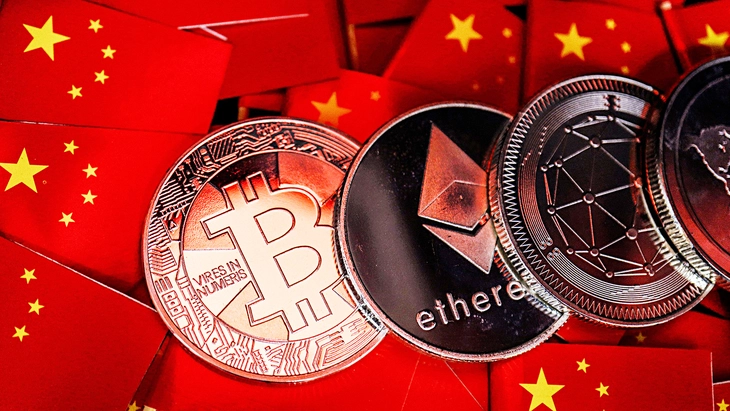
Illustration of popular virtual currencies and regulations in China - Photo: Reuters
Chinese tech giants Ant Group and JD.com on October 19 suspended plans to launch stablecoins in Hong Kong, after mainland China expressed concerns about the rise of privately controlled currencies.
So what is China doing with crypto, and what can Vietnam learn from its giant neighbor?
From "coin mining paradise" to forbidden zone
Just a few years ago, China accounted for more than 70% of global Bitcoin mining activity. Provinces like Sichuan and Xinjiang were once the "holy land" of coin mining farms.
But in 2021, Beijing suddenly changed course, issuing a comprehensive ban. The reason is not only China's concerns about financial risks, but also concerns about cybersecurity, environmental pollution and capital flow controls.
By May 2025, the order will be even tighter. Not only will trading, owning, or mining crypto be banned, China will also ban technology platforms from providing crypto prices or promoting cryptocurrencies in any form.
In other words, Beijing has slammed the door shut on all activities related to decentralized crypto – from Bitcoin to Ethereum to Dogecoin.
In the eyes of the current Chinese government, crypto is not a democratic financial revolution, but a “threat that could shake the foundation of the national monetary system.”
But in contrast to the mainland, Hong Kong has been given the green light by Beijing to experiment with new forms of digital currency, but under very tight "reins".
In May 2025, the Hong Kong Legislative Council passed the Stablecoins Ordinance Act, allowing companies to apply for a license to issue stablecoins. However, this legal framework is so strict that many businesses find it "very difficult to breathe".
On the one hand, China wants to encourage blockchain technology as a driver of innovation. On the other hand, they do not allow any form of crypto that could get out of state control.
Hong Kong thus becomes a “controlled laboratory” where Beijing observes, evaluates and intervenes when necessary.
The recent suspension of stablecoin issuance plans by Alibaba (via Ant Group) and JD.com in Hong Kong once again shows that China is looking to further tighten its grip on crypto.
The reason is simple: Beijing does not want its currency to become a "private playground". The People's Bank of China (PBoC) is concerned that stablecoins will create loopholes in capital controls and pose risks to the national monetary system.
The retreat of the above technology giants is a signal to the whole market: China does not want anyone, including domestic enterprises, to touch the currency without the direction of the State.
Suggestions for Vietnam
In Vietnam, crypto is at a "potential explosion point". The rate of crypto users in Vietnam is among the highest in the region, mostly from investment activities and the "play-to-earn" model. But so far, management policies are still cautious and lack a full legal framework.
In September 2025, the Government issued Resolution 05/2025 allowing a pilot licensing of crypto exchanges within the framework of the Digital Technology Law. However, the high minimum capital requirement (about 379 million USD), and the ban on stablecoins, have prevented any businesses from registering.
However, from China's lessons, Vietnam can still draw some principles for itself.
First, protect first, innovate later. Crypto may be attractive but it is also full of risks such as money laundering, fraud, price manipulation, affecting financial security. Vietnam needs to establish a solid "legal barrier" before fully opening up.
Second, encourage blockchain, but with "rein". Don't "sweep" crypto and platform technology. Vietnam should promote blockchain applications in agriculture , healthcare, finance, not just coin mining.
Third, learn from e-CNY (digital yuan). Vietnam can absolutely research the issuance of digital VND to modernize the payment system, serve digital transformation and enhance financial sovereignty .
Finally , create a sandbox (controlled testing mechanism) in Ho Chi Minh City or Hanoi. Instead of a blanket ban, Vietnam could set up a pilot area with strict regulations for companies to test stablecoins or blockchain products in a controlled environment.
Crypto is a trend, but not everyone can reach the destination. China has chosen its own way: tightening, controlling, and building its own digital version. That doesn’t mean Vietnam has to follow, but it can’t ignore it either.
Instead of following trends or banning them unconditionally, Vietnam should choose the path of "balancing innovation and safety", where technology serves national interests, rather than pushing the country into the global gambling game.
In the digital age, cryptocurrency policy is not just a technical issue but a test of each country's strategy. And Vietnam, if done correctly, can completely turn the challenge into a springboard for the digital economy to rise.
China tests e-CNY
Alongside the bans, China has made no secret of its ambition to become a leader in state-issued digital currencies (CBDCs). The e-CNY (digital yuan) is being tested in more than 20 cities, with a total transaction value exceeding 100 billion yuan.
This is not a “crypto” in the traditional sense. e-CNY is not decentralized, not anonymous, and is completely run by the PBOC.
But it allows Beijing to achieve important strategic goals: tighter control over capital flows; less dependence on the US-dominated international payments system; and moving toward “de-dollarization” of cross-border trade.
While free cryptocurrencies are labeled as “risky,” e-CNY is built as a “oriented” alternative. This is China’s way of creating a “purely Chinese” version of crypto, without the need for decentralization, but still with international ambitions.
Source: https://tuoitre.vn/quan-ly-crypto-bai-hoc-tu-trung-quoc-20251021093120728.htm





![[Photo] 60th Anniversary of the Founding of the Vietnam Association of Photographic Artists](/_next/image?url=https%3A%2F%2Fvphoto.vietnam.vn%2Fthumb%2F1200x675%2Fvietnam%2Fresource%2FIMAGE%2F2025%2F12%2F05%2F1764935864512_a1-bnd-0841-9740-jpg.webp&w=3840&q=75)
![[Photo] National Assembly Chairman Tran Thanh Man attends the VinFuture 2025 Award Ceremony](/_next/image?url=https%3A%2F%2Fvphoto.vietnam.vn%2Fthumb%2F1200x675%2Fvietnam%2Fresource%2FIMAGE%2F2025%2F12%2F05%2F1764951162416_2628509768338816493-6995-jpg.webp&w=3840&q=75)










































































































Comment (0)